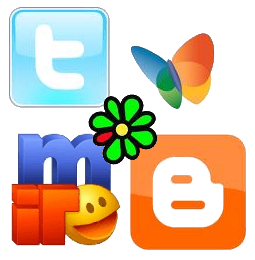YouTube announced that in 2010 our world wide population watched a total of 700 billion YouTube videos. That’s 700,000,000,000 views with 6,887,400,000 people (at the time of writing). Or just over 100 movies per Earth citizen. In 2010 the Internet penetration rate further grew to 28,7 % to about 1,966,514,816 people on June 30, 2010, twice as much as in 2007. That means nearly 2 billion people watched 700 billion movies, or an average of just over 354 movies a year each. Excluding countries where YouTube is forbidden (like China, 420 million Internetters) or where it is not yet available, that’s well over one video a day per Earth citizen with access to YouTube. » More: A video a day – amazing online numbers for 2010
Posts Tagged ‘Twitter’
(Micro-)blogging is here to stay?

Technologies that will soon all be forgotten
After some deliberation on whether to start a blog or not, I finally started one (this one) a month or so ago. This week I read in the local newspaper that blogging was old fasioned (sooo 2008) and being completely replaced by micro-blogging. Fortunately I recently started to use twitter as well, so I’m not completely worried about my digital affinity. On the other hand, until now I still try to find out what’s the advantage of Twitter over MSN, ICQ (a technology from the mid 90’s) or even an ordinary IRC channel (early 90’s). To me until now it doesn’t seem more than a slow group chat. It actually looks a lot like a big newsgroup discussion (first introduced on digital bulletin boards in the 80’s).
If I am to believe the numerous articles on Twitter, “this technology is here to stay”. It’s gonna change the way we spread news, it’s gonna change the way we use the internet, it’s going to change our lives. Surprisingly, this is exactly what I read about traditional blogging a few years ago. Did it really change our world? No, not really. Not surprisingly, it’s especially the companies that have interests in these technologies that spread these words first. And they are frequently copied by the early adopters.
I have decided to stop believing this kind of statements. Nearly no new technology is here to stay. (No reason not to enjoy them of course.) There might be exceptions, like perhaps the wheel, but even there I’m not sure yet. In practice it’s naive to think that any new technology will not be succeeded and eventually replaced by a newer technology sooner or later. And newer technologies rather sooner than later. In the mean time, I’ll just keep blogging.
Was playing with Twitter bad for Habitat?
In June this year, Habitat caused quite some fuzz when an intern misused Twitter by using keywords related to the Iranian political situation to promote posts about special offers. This was generally seen as wrong decision which has damaged their brand. However, I’m not sure this is the case.
Habitat generated quite some attention for its Twitter channel, its brand and its website. One might argue that this attention was negatively focused. And that is mostly true. On the other hand, as many others at the time of the incident, I was not a Twitter user and I heard about this in a less detailed way. I was told that this English furniture brand Habitat (which I knew from some nice shops here in The Netherlands) had accidentally messed up some online campaign. My association was not of a negative nature. Actually I thought it’s funny that a typical offline brand like Habitat (with it’s nice shops) makes mistakes in it’s online activities.
Most people probably don’t associate Habitat with ‘online’. In general people tend to try to put things in their context. The default context of Habitat is furniture, which is a relatively traditional kind of product, usually not bought online. (I for one would first want to experience the sitting comfort of any sofa I’d buy.) The Twitter incident does not relate to the most likely context of the brand. It does not say anything about the quality of its products. Also the overall ethics of the company are not really in question either.
Therefore it seems unlikely that the mistakes Habitat made with Twitter have damaged the company or its brand. They might even have benefited it. Most people might not have associated Habitat with ‘online’ before, but maybe some more people might now. And probably not even in a negative way. They might even visit the website.